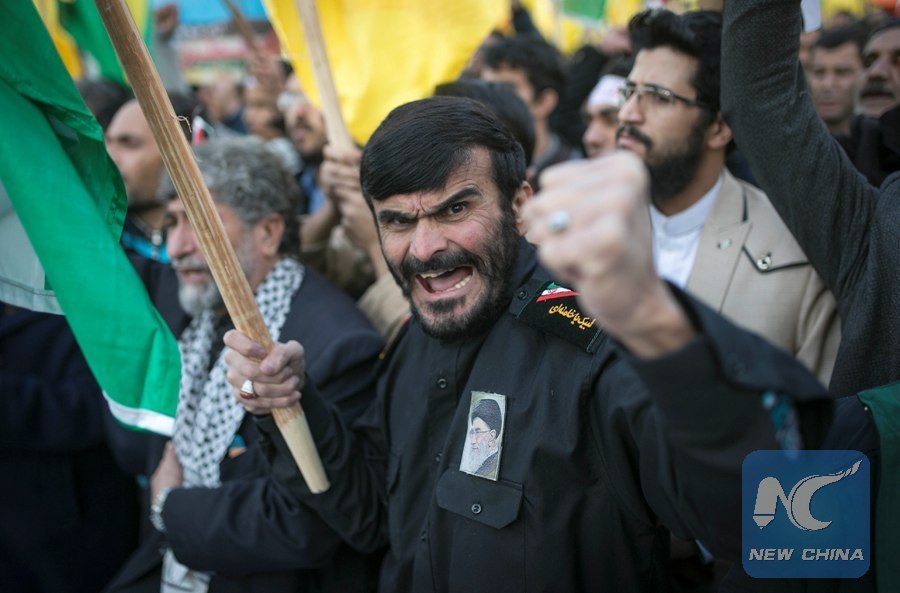
A man shouts slogans during a protest against U.S. recognition of Jerusalem, in Tehran, Iran, on Dec. 11, 2017. Thousands of Iranians held a rally on Monday to condemn the U.S. President Donald Trump's recent decision on Jerusalem. (Xinhua/Ahmad Halabisaz)
by Matthew Rusling
WASHINGTON, Jan. 5 (Xinhua) -- While U.S. President Donald Trump has expressed support for demonstrators in Iran and engaged in heightened rhetoric, the United States is likely to hang back and avoid direct involvement, U.S. experts said.
"The U.S. will probably limit its involvement mainly to moral support for the protestors," David Pollock, a senior fellow at the Washington Institute for Near East Policy, told Xinhua.
Protests erupted on Dec. 28, 2017, in Mashhad in north Iran, sparked by frustration over high prices of basic goods such as eggs, the price of which has recently soared by 40 percent, according to international media reports.
The unrest spread quickly over the next several days. Blue-collar Iranians also want a higher pay and a way to address the nation's widespread problem of unemployement, global media reported.
Trump took to social media earlier this week in support of the protesters, saying that Iran is "failing at every level" and that it is "time for change" in Iran.
Despite his pro-demonstrators tone, experts said the president is unlikely to go much further, with perhaps a few exceptions.
Pollock said Trump's rhetoric reflects the president's strong view of Iran as an enemy.
The protests were "not necessarily going to be historic in the grand scheme of things, and so maybe we don't want to get too carried away yet predicting what's going to happen next," said Michael O'Hanlon, a senior fellow on foreign policy at the Brookings Institution,
Many observers are asking why protesters chose this period to demonstrate. "They want the Iranian government to turn its attention homeward," O'Hanlon gave one explanation.
Analysts argued that it would be unwise for the United States to directly involve itself in the protests.
"Given the history of past U.S. involvement in Iranian domestic politics, the best thing for the United States would be to continue to do little to intervene or directly support these protests," Dan Mahaffee, senior vice president and director of policy at the Center for the Study of Congress and the Presidency, told Xinhua.
Iran has blasted back at the U.S. stance. Iran's ambassador to the United Nations Gholamali Khoshroo slammed the U.S. government's attempts to intervene in the domestic affairs of the Islamic Republic, Tasnim news agency reported Thursday.
"In the past several days, the U.S. administration, led by the U.S. president, has stepped up its acts of intervention in a grotesque way in Iran's internal affairs under the pretext of providing support for sporadic protests" in the country, Khoshroo said in a Wednesday letter to the UN Security Council and to UN Secretary General Antonio Guterres.
Khoshroo added that Iran expects all states to condemn such dangerous statements and policies and urge the U.S. government to act responsibly and adhere to the UN Charter and international law.

